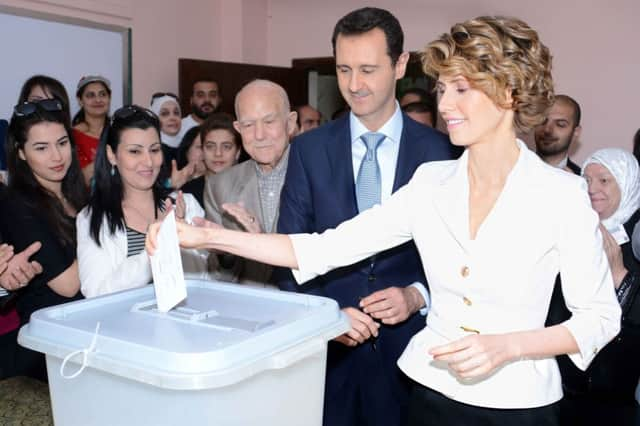Assad’s ‘blood election’ won’t stop Syria’s agonies


Some stamped their ballots with blood after pricking their fingers with pins supplied by the government in a symbolic act of allegiance and patriotism.
Others chose to vote in full public view – some in front of TV cameras – rather than go behind a curtain for privacy.
Advertisement
Hide AdAdvertisement
Hide AdMen and women wore lapel pins with Mr Assad’s picture and said re-electing him would give him more power to find a solution to a three-year conflict that has killed about 160,000 people, one third of them civilians.
Even as crowds of Assad supporters flocked to the polls in Damascus, the sounds of war were inescapable. The dull sounds of explosions reverberated in the distance as regime forces and rebels battled in nearby rural towns and plumes of smoke marked the skyline.
The balloting is only taking place in government-controlled areas and Mr Assad’s win – all but a foregone conclusion – would give him a third seven-year term in office and strengthen his determination to crush the insurgency against his rule.
The opposition’s western and regional allies, including the United States, the UK, France, Saudi Arabia and Turkey, have called the vote a sham.
Many activists are referring to it as the “blood election”.
The vote is also Syria’s first multi-candidate presidential election in more than 40 years and is being touted as a referendum on Mr Assad’s popularity. He faces two approved challengers, Maher Hajjar and Hassan al-Nouri, unknowns before declaring their candidacy in April.
In the government strongholds of Damascus and Lattakia, voters sang and danced as they declared loyalty to Mr Assad.
In Homs, Syria’s third-largest city, the atmosphere was more restrained, with people standing in long lines to vote.
The regime has presented the election as the solution to the conflict, but there is no indication it will halt the violence. The stage-managed balloting also puts to rest any illusions that Mr Assad has any intention of relinquishing power or compromising to end the war.
Advertisement
Hide AdAdvertisement
Hide AdSyrian TV said Mr Assad cast his ballot in the morning at a school in the wealthy Damascus district of al-Malki where he resides. TV showed him in a dark blue suit and tie, flanked by his London-born wife, Asma, both smiling.
However, a mortar shell crashed near the Opera House on Omayyad Square, one of Damascus’ two main plazas, but caused no damage or casualties.
At a polling station in the Dama Rose hotel, a cup filled with pins was on offer for those who chose to vote in blood. Some pricked their fingers repeatedly to ensure they bled enough to mark the circle under Mr Assad’s name on the ballot. Most, though, voted in ink.
“With the leadership of Bashar, my country will return to safety,” said student Uday Jurusni, who voted in blood. “He is my leader and I love him.”
There was no balloting in much of north and east Syria, where swathes of territory are in rebel hands. Tens of thousands of Syrians abroad voted last week, but many of the more than 2.7 million refugees across the region either abstained or were not allowed to take part.
In the rebel-held central town of Rastan, which has been under siege for more than two years, an activist who goes by the name of Murhaf al-Zoubi said residents “want Assad to go”. He said: “There are no elections here, this is a free, liberated area.”
A UK-based Syrian opposition figure, Muhieddine Lathkani, called the vote a “black comedy”. “This election has no value and no-one will recognise it, no matter what North Korea and Iran think about it,” he said, referring to Mr Assad’s key allies.